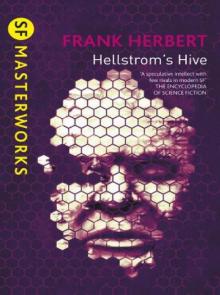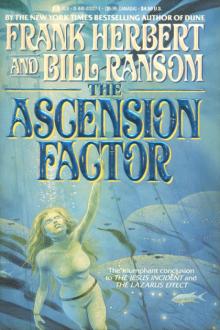- Home
- Frank Herbert
Four Unpublished Novels Page 10
Four Unpublished Novels Read online
Page 10
Gerard looked at the muscular bulk of him, said almost to himself. “I don’t think they’ll be dropping you down any light wells. No, indeed, I don’t.” His eyes stared up at Movius. “You clean this one up and I’ve a better job for you.” He turned, reached across the desk, opened a top drawer, pulled out a green pad. Using Movius’ stylus, he scribbled on it, finished, looked at the stylus and grinned. “Mind if I keep this as a sort of memento?”
“Not at all.”
Gerard pocketed the stylus, handed the note to Movius. “This presented at District Housing will get you an apartment in the privileged section—a special apartment where you’ll be safe. My own quarters are on the roof. I’ll have a car and driver assigned to you. We may as well come out in the open; there’s no way to keep your position secret after what happened today. You’ll go into CR-14 as my man and no questions asked.” Gerard waved a hand. “Take the rest of the day; report in the morning.”
“Will there be any trouble about the special status?” asked Movius. “The Sorter rated me clerk.”
“And I rated you executive assistant,” said Gerard. “That’s a bureau chief’s privilege.”
“Let’s get my duties straight,” said Movius. He looked down at the District Housing order in his hand.
“I don’t want to know what you do,” said Gerard. “You get rid of Newton. Either make it legal or make it look accidental.” He turned to Grace. “I’ll have you taken off the LP rolls.”
“You needn’t bother.”
Movius could tell from her tone that she’d formed a violent dislike for Gerard.
“You’re coming off the rolls anyway,” said Gerard. “Can’t have Dan worrying about his wife. You stick close to the apartment. I’ve a small army of guards on the place. You’ll be safe there.” He turned away, dismissing them.
As they went out the door, they heard Gerard on the phone. “Have a car and driver in the side driveway for Mr. Movius. And send up some building maintenance men. I want my pneumo tube yanked out and re-routed into the outer office.”
Chapter Twelve
And you were almost ready to get rid of Gerard?” said Glass. He leaned back against his desk, stared down at Rafe Newton.
The nephew avoided The Coor’s eyes. “I could …”
“You can leave Gerard alone!” Glass barked the words. “And you can get a sample of that poison gas for us. Gerard is suddenly too bold. I want to know how long Movius has been working for him. Probably all the time he was Liaitor. He could have booby traps in every department of government; he went everywhere. That gas! How could someone develop a thing like that right under our noses? That may be what’s making Gerard so bold.”
“Or desperate,” said Newton.
“I said bold.” Glass frowned. “We have to find out what his position is before we make a move.”
Newton shifted his position on the couch, “What about Movius?”
“Movius! Well, we know where he is now. Give Movius a couple of days to rattle around while we check back on everyone who contacts him. Then kill him.” Glass smiled without humor.
“And the new wife?”
“Leave her alone until you get rid of Movius. But pick up her father and the brother. The brother used to drive for Movius. That must be where he met the woman.”
Newton lowered his eyes. “The father and brother have disappeared.”
Glass lost his temper. “People can’t just disappear! Find them! You hear me? Drag in the wife …”
“I thought you said to leave her alone?” Newton sounded like a small boy objecting to a reprimand.
The Coor calmed himself, tightened his lips into a thin line. “So I did. Let that stand.”
“Okay, but …”
“Drag her in for questioning after you get Movius. Get your information.” Glass raised his voice to a roar. “And don’t let him slip through your fingers again!”
Chapter Thirteen
The apartment was higher on the hill than the Third Rank quarters had occupied before the low-opp. There was a feeling of silence, isolation in the new apartment never found in a Warren. And space. No sensation of the walls creeping closer with each passing day. The china clinked with a more refined tone. The blankets rustled more softly. Workers spoke in hushed undertones.
Grace came out of the bedroom with its twin beds and subtly richer furnishings. She scuffed a toe against the thick pile of the living room rug. Movius was sitting in one of the deep chairs looking out the floor-to-ceiling windows at the city.
“There’s a kitchen,” she said. “A dining room and a private kitchen-service tube if we want the regular meals. And the bathroom must be ten feet square. It has a tub.” She sat down on the arm of Movius’ chair.
“The privileges of the High-Opp,” said Movius. “There’s another one, too. We have a master scrambler on the roof. No spy beams can look in on the High-Opp.” He glanced up at her. “We don’t have to pretend we’re making love here. We can talk right out.”
She blushed.
“Where did you learn to shoot a fap gun?” he demanded.
She slipped from the chair arm, stood up, walked away from him. “My father taught me.”
“Your father has never …” He broke off, wondering if that were true.
She whirled on him. “My mother was killed in the educator riots! My father fought his way out with a stolen gun to save us! He still has it!”
So Grace had lost her mother the way he’d lost his. How the rioters had enjoyed killing the women, the breeders. He said, “I’m sorry. My mother got it the same way. I never knew her.” His voice had flat undertones.
“They didn’t tell me,” she said.
“They? Who are they?”
“I mean my father.”
The old bean pole? he thought. He said, “How would your father know?”
“He made inquiries.”
“Oh.”
So they had made inquiries. He let the silence grow cold between them. Grace returned to the arm of his chair.
“Why is Gerard putting an untried man into a tough spot?” he asked.
“You’re not exactly untried,” she said. “He has your Sorter record and he saw you in action today. Remember that.”
“He may be in a shakier position than he lets on,” said Movius. “He mentioned two attempts on his life.” He lifted himself from the chair, paced across the room and back, clenching and unclenching his fists. “But this is like grabbing at straws.”
She stood, walked to the window, turned around, silhouetted against the view of the city, her face in shadow. “Dan, please be careful.”
Her words touched off a flash of anger in his. She would have to go all female on him at a time like this. “Mind your own business!” he snapped.
Her eyes widened, she turned, ran into the bedroom. He heard the bathroom door slam, water turned on full force. Even above the noise of the water he could hear her sobs.
He flung himself into the chair and stared at nothing. And why do I keep thinking about the helpless way she looked at me today, standing there in Gerard’s office in that blanket? He gritted his teeth. And why did I get so angry because another man saw Grace unclothed? An isolated fragment of the wedding ceremony flitted through his mind, “…to cherish and to protect …”
Grace returned, stood in the doorway. Movius thrust his hands into his pockets to still their restless movements.
“Do we have any sleeping pills?” she asked. Her voice gave only a faint hint of the tears.
“I don’t know. Why?”
“I haven’t been sleeping well lately. There are none in the bathroom.”
“High-Opp apartments should come equipped with sleeping tablets,” he said. “Send out for some. Phone’s over there in the hall.”
“Would you go down to the servo-mat in the lobby and get me some?” she asked. “It would be quicker.”
The request coincided with his feelings. He felt he had to get away from the apartment, be
by himself to think. He couldn’t think with her standing there staring at him.
“I’ll get them,” he said. He got to his feet, walked past her to the hall door without looking at her.
She stopped him at the door. “Dan.”
He waited, hand on the knob. “Yes?”
“Thank you for saving me from Bu-Con. I know it would have been much simpler just to let them have me.”
“I was lucky.” Then he thought, Lucky! Anyone but that fat hypochondriac Addington would have pulled a gun first and called for a showdown.
He went out into the hall. An empty elevator stood open at his level. He stepped inside, punched for the lobby. The door closed and there was a sharp hissing sound. Instead of going down, the elevator surged upward. Movius punched the DOWN button a second time, noticed a strange tang in the air. He sniffed at it, felt the darkness sweet over him. “The Coor!” he thought. “Of all the dumb …”
Chapter Fourteen
We must give him the idea that Bu-Psych is omnipotent,” said O’Brien, leaning back in his chair, steepling his fingers before his mouth. “He must grow to feel that we know every move he makes.” O’Brien lowered his hands, leaned forward.
Grace stood at the end of the table, back to the chart with the single red line. The line had been carried perhaps an inch farther along its journey, rising slightly.
“I understand,” she said. “It’s the only way you can control him.”
“I wanted a chance to talk to you, anyway,” said O’Brien. He leaned back, pressed his fingers against his greying temples. “I learned today that you’ve been asking questions of one of our consultants.”
She turned her profile to him, stared at the chart on the other wall.
O’Brien leaned forward. “Why did you ask what kind of a husband a man with a high loyalty index makes?”
“I was curious.” Her tone was defiant.
“And your curiosity was satisfied? You found out they make extremely devoted husbands.” He slapped his hand against the table top to startle her. “Grace! If you were called upon to eliminate him today, what would you do?”
She paled. “Maybe you’d better get somebody else.”
“We can’t. We don’t dare arouse his suspicions.”
“Then I’d have to … to do it,” she said, her voice low. She turned, looked at O’Brien. “Nate, what is the loyalty index, really?”
“I don’t know if I can answer that question in simple terms,” he said. “Essentially, though, I guess you could say it measures the feeling a person has for the welfare of others.”
She nodded. “Where is he?”
“Let’s not get sentimental,” said O’Brien. “He’s under hypnos now, being examined. We want to know how he feels toward you.” O’Brien leaned back.
Her hands began to tremble and she clasped them tightly together. “He’s very resourceful,” she said.
O’Brien looked at her hands, the knuckles so white where she clasped them. He tugged at an ear. “Yes. Now we want to know how he operates in CR-14. He knows Newton will be out to kill him as he did the other man Gerard sent down. He also knows that Gerard’s threat may not keep Addington and The Coor away.”
She turned a piercing stare upon him. “What do you think Dan will do?”
O’Brien glanced at the red line on the chart. “Our treatment has been pretty drastic. He has been thrown into a tough problem situation. My guess is he’ll show his ruthless side. He’ll stamp on Newton the way he’d stamp on an insect. Addington and The Coor, too, given the chance. It’s a delicate situation, but one calculated to win Gerard’s trust if he succeeds. That’s what Gerard would like to do to his enemies—stamp on them—if he dared. I believe Gerard is taken in by the loyalty index. He thinks he has won Movius’ loyalty. Gerard doesn’t know too much about the variants on the index.”
“What about my father?” she asked. “Does he have a ruthless side, too?”
“All revolutionaries have a ruthless side,” he said. “They have to be practical. That means doing the thing that is necessary. Your father and brother had to go into hiding today. We had planned on it.”
“Hiding?”
“You’ve been recognized as Mrs. Movius,” said O’Brien. “Your relations, therefore, know something. They might be … uh, persuaded to reveal what they know.”
Grace sighed, looked down at her hands.
“You have been remembering that you are a woman,” said O’Brien. “You must put that memory aside. You are a Bu-Psych operative. When this is all over, the crisis past, you can find some nice young man …”
He watched, calculatingly, as Grace turned away, went to the door, opened it slowly. She kept her face averted as she spoke. “I’ll leave now if you don’t mind. We can’t let him see me here when you bring him out.”
“Of course.”
She closed the door behind her.
O’Brien jerked to his feet, stood at the window, staring out over the city where lights were beginning to spring alive in the dusk. “Such weak tools,” he whispered. “Put a little strain on one and it bends out of shape.”
Chapter Fifteen
It was the same hard pallet in the same red-walled cell. Movius sat up, put his feet over the edge. What was O’Brien trying to prove? Something Quilliam London had said came back to Movius: “Find out what the other man wants.” He’d used that idea once before this day—on Gerard. All right, what did O’Brien want? Why this method of bringing him in? To make him believe that Bu-Psych was omnipotent, maybe that they could pick him up any time. But that could mean that underneath it all O’Brien was unsure. The man who knows his own strength doesn’t stand around flexing his muscles. The thought gave him confidence. He got to his feet, waited until the end door opened, strode to meet O’Brien as the Bu-Psych chief entered.
“Let’s talk outside,” said Movius. “Your red walls have lost their potency.”
O’Brien hesitated for the briefest instant. “Of course.” He tossed a canvas chair onto the pallet, turned and led the way out of the cell. “My office is over here.” He opened the door for Movius, followed him into the room of the charts.
Movius glanced swiftly around the room, saw the chair he knew must be O’Brien’s at the end of the table, strode to it, sat down. O’Brien appeared not to notice.
“I wanted to hear from your own lips what happened with Warren Gerard today,” said O’Brien. He lowered himself into the chair usually occupied by Quilliam London, unconsciously assumed London’s pose of reserved superiority.
From my own lips, thought Movius. That could mean he already has heard the story. From who? Addington? Gerard? The gladiator? One of Addington’s men? Grace? But she was back at the apartment. He glanced at the windows. Nearly dark. He had entered the elevator shortly after noon. Grace could have been here. Why had they kept him unconscious so long?
“Your report is the price of your continued freedom,” said O’Brien. “Let’s have the story.”
Movius sat back. The story? All right. A bare recounting. He held out no essential details, watched the unmoving way O’Brien accepted the information. Yes, he had heard it before. Movius finished, waited.
O’Brien said, “How is your marriage with Grace London coming?”
Now why would O’Brien be interested in his married life? Out of some perverse impulse, Movius said, “We’re expecting our first baby in the Spring.”
He hadn’t expected the reaction from O’Brien. The Bu-Psych chief jerked to attention, took two deep breaths, suddenly jumped to his feet. “I just thought of something,” he said and dashed out of the room.
That hit him, thought Movius. Why?
In a moment, O’Brien returned, sat down, wiped his forehead with a handkerchief. “Important business I forgot to attend to,” he said lamely.
“Let me ask a question,” said Movius. “The last time I was here you spoke about a crisis. What is this crisis?”
O’Brien waited a full minute before an
swering, head lowered, staring upward at Movius.
I hit him hard with that remark about Grace, thought Movius. But why? What difference could it make to him?
O’Brien stirred in his chair, rubbed the greying temples with the tips of his fingers. “Our civilization is nearing a catastrophic crisis.” He nodded toward the side wall chart with its multi-colored lines. “There’s the course of history as far back as we know it. Civilizations arose and fell. But we’ve learned something—their crises were predictable from various indications. We have charted these indications and know we are approaching such a crisis. Our work indicates it will be of such a nature that it could leave nothing upon which to build a new civilization.”
Movius thought of the stirrings and rumblings in the Warrens, of the old people and their warnings of terrible omens. He multiplied what he had seen by the world’s LP population, the reports of his own Sep couriers. This brought another thought: strange that O’Brien had not asked about the Sep movement. The indications were that he still had his spy in the Seps. Navvy hadn’t reported success in his search. Could it be Navvy? He thought about this, returned to O’Brien’s warning. He said, “The crisis would leave no one alive?”
“Certainly there would be people left alive.” O’Brien’s tone said it was a foolish question. “The whole population never participates in a revolution.”
“Civilizations aren’t built by charts on walls,” said Movius. “People build civilizations.”
O’Brien frowned. “But what kind of a civilization? One that would not profit from our mistakes, from our lessons. We seek to raise humanity above its past heights.”
A story from one of his father’s books came back to Movius. A Greek mythological hero, Antaeus, had gained his strength from touching the earth. He said, “You fancy yourself as Hercules and the people as Antaeus. You should remember what happened to Antaeus when he stayed too long from his source of strength.”
The classical reference brought a sharp look of questioning from O’Brien. “You are a philosopher.”

 Direct Descent
Direct Descent The Ascension Factor
The Ascension Factor The Heaven Makers
The Heaven Makers Children of Dune
Children of Dune Old Rambling House
Old Rambling House Dune
Dune The Worlds of Frank Herbert
The Worlds of Frank Herbert The Jesus Incident
The Jesus Incident Heretics of Dune
Heretics of Dune Whipping Star
Whipping Star Dune Messiah
Dune Messiah Man of Two Worlds
Man of Two Worlds The Book of Frank Herbert
The Book of Frank Herbert Hunters Of Dune
Hunters Of Dune The Tactful Saboteur
The Tactful Saboteur Soul Catcher
Soul Catcher God Emperor of Dune
God Emperor of Dune The White Plague
The White Plague The Green Brain
The Green Brain The Godmakers
The Godmakers Sandworms of Dune
Sandworms of Dune Destination Void
Destination Void The Dosadi Experiment
The Dosadi Experiment Eye
Eye High-Opp
High-Opp The Eyes of Heisenberg
The Eyes of Heisenberg Missing Link
Missing Link Hellstrom's Hive
Hellstrom's Hive Chapterhouse: Dune
Chapterhouse: Dune The Santaroga Barrier
The Santaroga Barrier The Dragon in the Sea
The Dragon in the Sea Operation Haystack
Operation Haystack A Thorn in the Bush
A Thorn in the Bush Four Unpublished Novels
Four Unpublished Novels Dune dc-1
Dune dc-1 Jorj X. McKie 1 - Whipping Star
Jorj X. McKie 1 - Whipping Star DV 4 - The Ascension Factor
DV 4 - The Ascension Factor Frank Herbert - Dune Book 4 - God Emperor Of Dune
Frank Herbert - Dune Book 4 - God Emperor Of Dune ChapterHouse: Dune dc-6
ChapterHouse: Dune dc-6 The Ascension Factor w-4
The Ascension Factor w-4 A Game of Authors
A Game of Authors Children of Dune dc-3
Children of Dune dc-3 Destination: Void: Prequel to the Pandora Sequence
Destination: Void: Prequel to the Pandora Sequence The Collected Stories of Frank Herbert
The Collected Stories of Frank Herbert Dune Messiah dc-2
Dune Messiah dc-2 Frank Herbert - Dune Book 5 - Heretics of Dune
Frank Herbert - Dune Book 5 - Heretics of Dune DV 3 - The Lazarus Effect
DV 3 - The Lazarus Effect The Jesus Incident w-2
The Jesus Incident w-2 The Lazarus Effect w-3
The Lazarus Effect w-3 Frank Herbert
Frank Herbert The Ascension Factor: Pandora Sequence
The Ascension Factor: Pandora Sequence Dune (40th Anniversary Edition)
Dune (40th Anniversary Edition) The Dosadi Experiment c-2
The Dosadi Experiment c-2 The Lazarus Effect
The Lazarus Effect God Emperor of Dune dc-4
God Emperor of Dune dc-4 The Pandora Sequence: The Jesus Incident, the Lazarus Effect, the Ascension Factor
The Pandora Sequence: The Jesus Incident, the Lazarus Effect, the Ascension Factor The Green Brain (v4.0)
The Green Brain (v4.0) The Heaven Makers (v4.0)
The Heaven Makers (v4.0) Heretics of Dune dc-5
Heretics of Dune dc-5